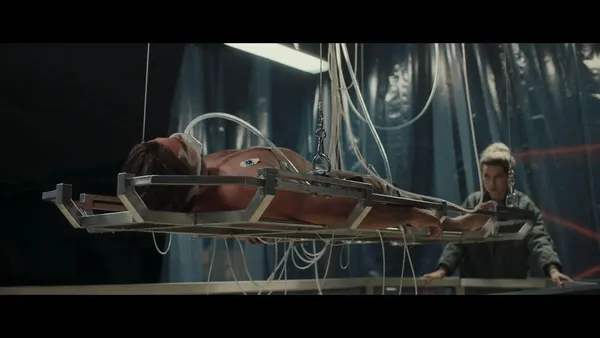Eye For Film >> Movies >> Restore Point (2023) Film Review
Restore Point
Reviewed by: Jennie Kermode

In discussions about defeating death, there is a tendency for views to be polarised between those who see it as a natural extension of the millennia-long fight to cure disease and those who fear that it would usher in a dystopia by leading to massive overpopulation or further entrenching power in the hands of a tiny minority. There is very little talk of how it might be used in contexts other than providing immortality. Robert Hloz’s Restore Point, written by Tomislav Cecka and Zdenek Jecelin, presents a scenario which in the short term at least seems far more likely: that such technology might be used to distribute life more fairly by providing a recovery option for those who died before their time.
There is a vast wealth of material which might be explored here. We are privy to no discussion over what constitutes an ‘unnatural death’. The pressure for legalisation of the procedure stems from a high murder rate caused by spiralling social problems, we are told, and at one point we see a boy who has been restored using ‘cellular tissue regeneration’ (not beyond the bounds of possibility, but the hard part is getting regenerated cells arranged in the right way – there’s a reason why bodies take so long to develop naturally) after a car accident, but of course far more people die prematurely each year due to illness, and we learn nothing about them. What we do get is the highly unlikely but narratively necessary contention that restoration is only possible within 48 hours because of some requirement to align the consciousness with the cells. Most people take frequent recordings of their consciousness to ensure that a suitably recent one will be available in the event of an emergency.
The film’s central character, police detective Em Trochinowska (Andrea Mohylová) is brought in to investigate when a key developer of the new technology, David Kurlstat (Matěj Hádek) and his wife are found murdered with their back-ups erased for the Restoration Institute’s computer system at around the same time. Suspicion immediately falls upon the anti-restoration terrorist group River of Life (whose motives are roughly in line with those discussed at the start of this review), but Trochinowska is suspicious when she finds the Institute’s CEO, Rohan (Karel Dobrý), only superficially cooperative. Is he just protecting corporate secrets or is there something more going on? The plot thickens when Kurlstat reappears, restored from an old back-up (and in poor physical condition because of it). Obliged to keep his existence a secret and with no memory of the critical 48 hour period leading up to his death, he is determined to solve his own murder, D.O.A.-style.
Screening as part of the 2023 Fantasia International Film Festival, Restore Point has many of the qualities of the great classics of science fiction cinema. It’s handsomely produced despite a comparatively low budget, making selective use of existing architecture to conjure up a near future world. It’s well acted all round but the performances are carefully reined in and never allowed to distract from the central thrust of the plot. Its ideas are not ultimately as well realised as they might have been, and that’s disappointing; they also bear a close resemblance to much of what has recently been addressed in Altered Carbon. The thriller aspects are well handled, however, and sharp enough that many viewers will sail through the film blissfully unaware of its shortcomings.
It’s nice to see a film which problematises familiar, overly comfortable assumptions about the sociological response to new technologies, and which doesn’t insist that babies need to be thrown out with bathwater. Filip Marek’s lensing gives the whole thing a stylistic shine which allows utopian and dystopian elements to slot together neatly in a world which is mixed-up enough to feel real. Hloz’s confident approach is pretty effective in distracting from the fact that we’ve seen a lot of this before. It may not bear too much scrutiny, but it’s a well-realised genre piece, and most viewers will go away satisfied.
Reviewed on: 26 Jul 2023


















